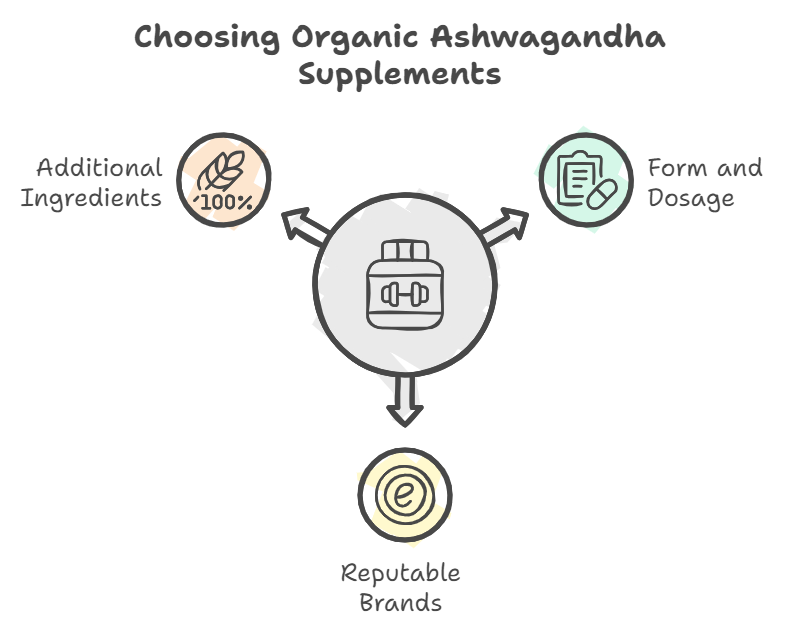People are always looking for ways to improve their wellness. More and more are turning to natural remedies like organic ashwagandha.
This powerful adaptogen is gaining recognition for its potential health benefits. This guide covers the origins, uses, and side effects of organic ashwagandha.
Understanding Organic Ashwagandha
Ashwagandha (Withania somnifera) is also known as Indian ginseng or winter cherry. This small shrub is native to India, the Middle East, and parts of Africa.
It has a rich history in Ayurvedic medicine, dating back thousands of years. Organic ashwagandha is ashwagandha grown without synthetic pesticides, herbicides, or fertilizers1.
This ensures a purer and more natural product. Choosing organic ashwagandha contributes to a healthier planet.
What Makes Organic Ashwagandha Unique?
The increasing demand for organic products extends to herbal supplements. Organic ashwagandha root is a popular choice. But what makes organic ashwagandha stand out from its non-organic counterparts? Let’s take a look.
Purity and Absence of Harmful Chemicals
Organic ashwagandha is cultivated using sustainable and environmentally friendly practices. These practices are clinically studied for their effectiveness. It is free from harmful chemicals such as pesticides, herbicides, and fungicides2.
These chemicals can accumulate in the plant’s roots and leaves. When ingested, they may pose potential health risks. For a certified organic option, look for the USDA organic seal.
Enhanced Nutrient Profile
Some evidence suggests that organic crops may have more nutrients. This is compared to conventionally grown crops. Research on ashwagandha is still ongoing.
Organically grown ashwagandha may potentially offer a richer source of beneficial compounds. These compounds are responsible for ashwagandha’s adaptogenic effects, such as stress reduction3.
Environmental Sustainability
Environmental sustainability is a key factor when choosing organic ashwagandha. By opting for organic farming methods, growers help preserve biodiversity, ensuring that the variety of plants and animals in the ecosystem remains intact.
These methods also promote soil health by avoiding harmful chemical inputs, which can degrade soil quality and disrupt natural microbial activity over time. Organic farming helps maintain a balanced ecosystem by using natural composts and organic fertilizers, which improve soil fertility and structure, leading to healthier crops.
Water conservation is another major benefit of sustainable farming practices. Organic farms often employ more efficient water management techniques, such as drip irrigation or rainwater harvesting, which minimize water waste.
Methods not only reduce the environmental footprint but also help protect local water sources from contamination by harmful pesticides and fertilizers.
Moreover, organic farming reduces greenhouse gas emissions by avoiding synthetic fertilizers, which are often made from fossil fuels.
This supports a lower carbon footprint and combats climate change. By choosing organic ashwagandha, consumers contribute to these broader environmental efforts, helping to foster a more sustainable and resilient agricultural system for future generations.
Benefits of Organic Ashwagandha
This powerful adaptogen has been shown to promote wellness. It may potentially assist with a variety of health concerns4. The root ashwagandha has been a popular search in the health care space as more people are seeking more than just stress relief.
Stress Relief and Improved Mood
Organic ashwagandha’s role in stress management goes beyond cortisol regulation. As an adaptogen, it helps balance the body’s response to both physical and emotional stressors.
Studies show that ashwagandha can reduce symptoms of chronic stress, which often leads to conditions like anxiety, depression, and even heart disease. By lowering cortisol, it promotes a more balanced nervous system and supports overall mental health.
Additionally, ashwagandha has shown potential in reducing stress-induced food cravings, which can be beneficial for weight management.
Its impact on energy levels and fatigue reduction also makes it ideal for people who experience burnout or stress-related exhaustion.
Moreover, consistent use of organic ashwagandha may contribute to better sleep patterns, improved cognitive function, and enhanced mood, all of which are linked to how the body handles stress.
In summary, this powerful herb doesn’t just help you feel calmer but may improve your overall well-being by reducing the negative effects of prolonged stress.
Enhanced Cognitive Function
Studies suggest that organic ashwagandha may boost brain function, too. It may reduce stress, as well. This includes memory, focus, and information processing speed. Some studies have even shown potential benefits for those with age-related cognitive decline5.
For a gluten free option, be sure to check the label. Many organic ashwagandha supplements will be gluten free. Look for gluten free vegan options as well.
Improved Sleep Quality
Difficulty falling or staying asleep can disrupt daily life and impact overall health. Many are now turning to natural remedies like ashwagandha, traditionally used to manage stress, which also shows potential as a sleep aid.
This herb can help improve sleep quality by promoting relaxation and reducing anxiety without the grogginess often associated with conventional sleep medications.
Ashwagandha’s active compounds, including triethylene glycol found in its leaves, are believed to induce sleep naturally. Research suggests that it may help regulate the body’s cortisol levels, supporting better sleep patterns, especially for those experiencing stress-induced insomnia.
However, if you are on any medications, it’s important to consult with a healthcare professional to avoid any potential interactions.
For more detailed information about insomnia and natural treatments like ashwagandha, check out this guide: Insomnia and Sleep Disorders.
Potential Support for Immune Health
Ashwagandha’s immune-boosting potential stems from its rich content of bioactive compounds, such as withanolides, alkaloids, and flavonoids.
These compounds exhibit strong antioxidant and anti-inflammatory properties, which are essential for supporting a healthy immune response. Antioxidants help neutralize free radicals, reducing oxidative stress in the body, which can weaken the immune system over time.
Additionally, research suggests that ashwagandha may stimulate the production of white blood cells, which are critical for fighting infections and pathogens.
It can also enhance the activity of natural killer (NK) cells, a type of immune cell that plays a crucial role in defending the body against viral infections and tumors.
By reducing inflammation and regulating immune responses, ashwagandha may help the body respond more effectively to stressors, which can suppress immunity when left unchecked.
Furthermore, it supports adrenal function, promoting overall resilience, which is vital for preventing illness and maintaining long-term immune health.
Incorporating organic ashwagandha into your routine may not only protect you from everyday infections but also help your body stay strong in the face of environmental stress and seasonal illnesses.
“Ashwagandha is a powerful adaptogen that can help the body manage stress and improve overall vitality.”
Dr. Andrew Weil
Choosing the Right Organic Ashwagandha Supplement
Not all ashwagandha supplements are created equal. When choosing an organic ashwagandha supplement, look for certifications like USDA Organic or other reputable third-party certifications. Make sure there is a verified buyer section to ensure you’re buying a quality product.
Consider these factors when selecting an organic ashwagandha supplement:

Form and Dosage
Organic ashwagandha is readily available in various forms, such as capsules, powders, and liquid extracts. The optimal dosage may differ depending on factors such as age, health status, and individual needs. Consult with a healthcare professional to find the right dosage.
Reputable Brands
When choosing organic ashwagandha, prioritize reputable brands. They should adhere to strict quality control measures and transparency in their sourcing and manufacturing processes.
Additional Ingredients
Check the supplement’s label for extra ingredients. This is important if you have dietary restrictions or sensitivities. Some formulas add herbs or nutrients to boost effectiveness or target health issues.
Incorporating Organic Ashwagandha into Your Daily Routine
Ashwagandha can easily be integrated into your daily routine:
- Morning Routine: Add organic ashwagandha powder to your morning smoothie or drink. It boosts energy and focus.
- Afternoon Pick-Me-Up: Try ashwagandha capsules. They can help with stress and focus.
- Evening Wind-Down: A warm cup of milk or a tea with organic ashwagandha can help you relax and sleep well.
Frequently Asked Questions
What is organic ashwagandha used for?
Organic ashwagandha is primarily used for its potential stress-reducing and mood-boosting effects. It may also improve sleep, boost brain function, and support immunity. People take ashwagandha to fortify adrenal function.
What happens when you take ashwagandha daily?
Daily use of organic ashwagandha, as part of a healthy lifestyle, may help. It may regulate stress, promote calm, improve sleep, and support cognitive health. Be sure to consult with your doctor if you have any questions.
Are there negative side effects to ashwagandha?
Organic ashwagandha is generally well-tolerated. But, like any supplement, some may have mild side effects. These can include an upset stomach or drowsiness. Always consult a healthcare professional before adding a new supplement.
What is the difference between organic and non-organic ashwagandha?
Organic ashwagandha is grown without synthetic pesticides, herbicides, or fertilizers. This makes it a purer, more natural product than non-organic ashwagandha. It’s better for both you and the environment. Non-GMO products are growing in popularity.
Conclusion
Incorporating organic ashwagandha into your daily routine can unlock a multitude of health benefits, enhancing not just mental clarity but overall well-being. This ancient adaptogen is renowned for its ability to support the body in managing stress, improving focus, and promoting restorative sleep.
As we navigate the challenges of modern life, organic ashwagandha stands out as a natural ally, helping to bolster immunity and resilience. Its unique properties make it a valuable addition to a healthy lifestyle, allowing you to harness your full potential.
By choosing organic ashwagandha, you’re not only investing in your health but also contributing to sustainable farming practices that benefit our planet. Embrace this powerful herb and discover how it can transform your health and vitality in today’s fast-paced world.
Consider starting with a small dose of organic ashwagandha powder in your morning smoothie or tea. Monitor how you feel over the next few weeks, and adjust accordingly.
Small Step, Big Impact
Before incorporating ashwagandha into your routine, consult with a healthcare provider to ensure it’s appropriate for your individual health needs and circumstances.
Listen to this article
This is an AI generated Podcast version of the article.
- https://pmc.ncbi.nlm.nih.gov/articles/PMC3252722/[↩]
- https://www.researchgate.net/publication/363631872_Controlled_Environment_Production_of_Ashwagandha_Withania_somnifera_L_Dunal[↩]
- https://www.medicalnewstoday.com/articles/how-accurate-are-the-claims-about-ashwagandhas-benefits[↩]
- https://www.nmi.health/ashwagandha-a-review-of-clinical-use-and-efficacy/[↩]
- https://www.mdpi.com/2072-6643/16/15/2481[↩]



